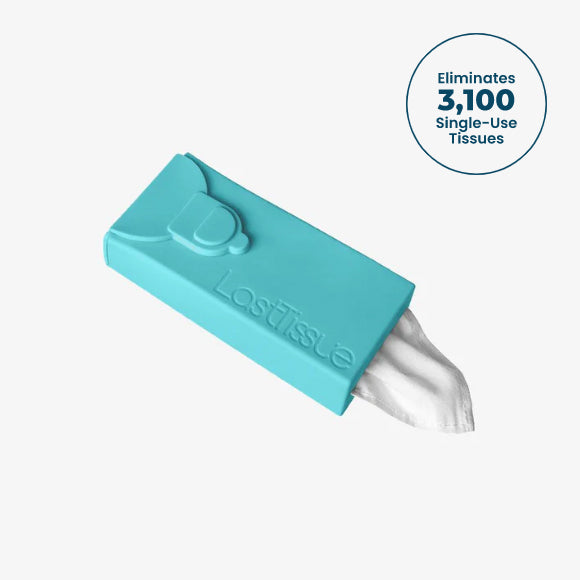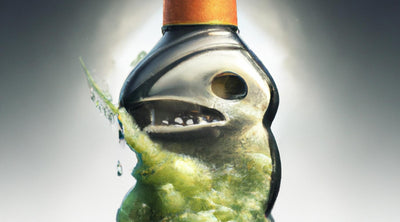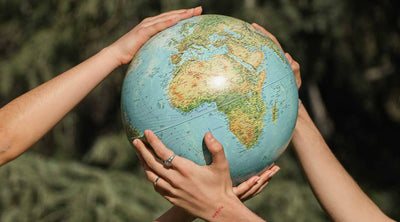Greenwashing: are Paper bags much Better than Plastic ones?
March 30, 2020We see this a lot, environmental choices that are sort of halfway there, but not quite effective. They really aren’t that great of an option yet we tend to choose them anyways. Maybe out of convenience, maybe because we truly believe it’s much better for the planet.
Maybe because greenwashing exists and companies are trying to sell you products that make you feel better about your impact.

It’s important we get clear on the footprints associated with different actions. We want to make sure the action we are taking has a truly reduced footprint so it will better our impact without wasting our time.
In this article we’ll look specifically at the action of switching from a single use plastic bag to a single use paper one. Are paper bags all that much more sustainable than plastic?
The (very) short answer: No.
The better alternative: Reusable bags made from natural fibers, or whatever you already own.
Digging into the details on this feels a lot like when we talked about choosing cotton over bamboo for LastTissue in this article.
While sometimes the detail and information can overwhelm us, it can be useful if we are searching for the reasons behind our actions. That being said, if you’re fine with just abiding by the short answers above and more information would just be discombobulating, then cool.
If you want to dig in, then let’s begin.
First, what is greenwashing?

Greenwashing can be a relatively broad term, but in summary: it is when a company or individual provides misinformation or hides correct information in order to make people believe their brand or products are better for the planet.
You can see this especially in the fashion industry. Companies with their core business models being fast fashion and terrible for the planet are taunting their sustainable practices. This makes us believe we’re purchasing products that are better or even good for the planet. Which makes us buy more!
But when we peel back the curtain we see things like “energy efficient lighting” and oh my god I just fell asleep.
How paper bags became a part of greenwashing

Paper bags are believed to be much better for the planet for a variety of reasons:
- They look more natural.
- Businesses use paper bags as a way to market their sustainability.
- This tends to be the only option available in places where plastic bags are banned. Which makes them appear as the more sustainable option.
Let’s face it, paper bags are more natural. Natural in the sense that they are made from trees.
They are very unnatural however, in the sense that we cut down trees, transport the trees, process the trees into paper, ship the paper, turn it into paper bags, then ship the paper bags, then people use them once and throw them away or maybe recycle them.
It’s worth noting that businesses are beginning to change their means of marketing, but a lot of grocery stores in the past have touted using paper bags as a more eco friendly alternative. Especially because the paper comes from forests that are “managed responsibly.” This greenwashing has led to a lot of misinformation and feelings of “my paper bags are saving the world.”
If you live in an area where plastic bags are either banned or businesses simply don’t supply them anymore, the single-use alternative widely available is usually the paper bag. A knee jerk assumption could be that this means paper bags are eco friendly, since they are not banned and are still being used.
Why paper bags ‘ain't as green as they seem’

A perfect example for why paper bags aren’t great is also why single tissues aren’t so great either. In fact, they’re terrible. Which is why we created LastTissue! Paper bags, like tissues, are made from trees. You know, the things we need in order to breathe? The things we need in order to suck up the carbon we pump out.
Trees are under threat while 53 billion are cut down every year. This is due to things such as fires, making room for agriculture and extraction, and creating products from wood and paper like...paper bags.
Typically, the trees that are replanted to replenish the forests are done so in a way that does not even compare to the biodiversity of the original forest. They end up being a monoculture of trees that don’t allow for different species of plant life to form. Much like a monoculture field of corn.
Paper bags contribute to:
- Deforestation.
- Massive amounts of energy use.
- Transportation emissions.
- Water use.
And this all increases in severity especially when the product is single use. Which paper bags of course are. This process is very unsustainable.
Even if the footprint of one single paper bag were better than plastic, they are still largely unsustainable especially when they gain popularity as an alternative to plastic bags.

So why harp on products that are maybe (slightly) better for the planet? Because it gives us a false sense of doing good. Also, a lot of us live busy lives and making changes is difficult, so we shouldn’t waste our time and energy on something that doesn’t have much of an impact.
The better alternative is always to go reusable. Of course the reusable bag has a footprint associated with manufacturing it, but if that bag lasts a long time, eventually that footprint will be zero once it saves enough single use bags.
Don’t be afraid to peel back the curtain on these issues, it may require a little more work up front, but it saves a lot of time and energy in regards to our footprint and impact later on down the line.
MORE Sustainability 101 ARTICLES View all ›
Ready to make
the switch?
- Powerful Cleaning
- Dissolves Easily
- Skin-Friendly
- Eco-Friendly
- No Mess














